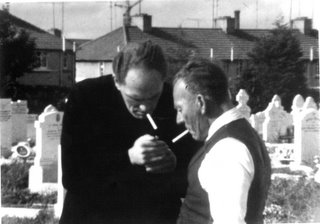The Rocky Road To Dublin
 Dir. Peter Lennon & Raoul Coutard, Ireland 1968 70 minutes CLUB
Dir. Peter Lennon & Raoul Coutard, Ireland 1968 70 minutes CLUB Tuesday 31st January
In the late sixties, while the Beatles were advocating a peaceful people-power approach to sudden change, a young Paris-based Irish journalist was becoming pre-occupied with an earlier, altogether different, type of revolution and one which he certainly didn't feel had turned out to be "alright". Peter Lennon, a Guardian correspondent had long been disenchanted with the Irish society that evolved after independence in 1921, believing it to have been a revolution that essentially failed to live up to its idealistic origins as it became hijacked by more reactionary forces. These elements then conspired to build a society that was, he feels, in many ways as restrictive as the one which it replaced. Lennon, who left Ireland in the late '50's, believing it to be "a country with its future in the hands of people who think in terms of the past" wished to debate this question with a wider audience. Thanks to the sponsorship of Victor Herbert, a wealthy American businessman who was swayed by Lennon's silver-tongued enthusiasm, he had enough money to make a documentary around this theme. The resulting film The Rocky Road to Dublin was the most important independent documentary to come out of Ireland in the 1960's and unsurprisingly provoked a storm of controversy from a nation that was not used to such rigorous self-examination. It also achieved huge notoriety in France when it was later shown during the student demonstrations of May 1968. The Rocky Road to Dublin was the only film that Lennon ever made. It had a short run in Dublin but it never received a provincial release. It has never been broadcast on television. RTE apparently believing it to be too contentious for domestic consumption in the 1960's, '70's or even '80's. - Vincent BrownePlus The Making of Rocky Road to Dublin, directed by Paul Duane, which does an excellent job of putting the original film into context. Coutard comes out of retirement to talk about the background to the film and its political significance. There’s some remarkable, previously unseen footage of Lennon confronting Godard and Truffaut at Cannes, plus scenes of demonstrations around the Sorbonne as revolutionary fervour peaked.
0 Comments:
Post a Comment
<< Home